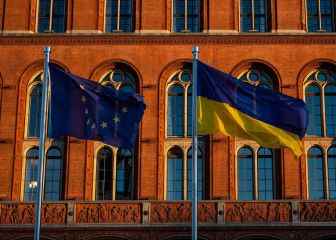The war started by Russia on Ukrainian soil has once again brought the desire of this country, a former member of the former Soviet Union (USSR), to belong to the European Union. In the last hours, the European Union has announced the first step for its accession to the EU. It will be the beginning of a process that can take years until its certification.
The option of entering the European group was born in the year 2014, after the signing of an association pact that was finally not ratified by Kiev. That led to protests known as Euromaidan, which ended with the ouster and escape of former president Viktor Yanukovych. Now, the current Ukrainian leader, Volodymyr Zelensky, and with a completely different situation, tells MEPs that “the European option” is your option.
Today there are five countries that aspire to join the European community, born in November 1993 with the Maastricht Treaty: Turkey (since 1999), North Macedonia (2005), Montenegro (2010), Serbia (2012), and Albania (2015). Ukraine wants to join them and thus increase the number of nations that currently form the twenty seven.
What Ukraine’s entry into the EU means
Since 2016, with the entry into force of the Free Trade Agreement and Association Agreement, political and economic ties between Ukraine and the EU have been strengthened. Now, Zelensky is looking for a greater involvement of the European bloc, and this involves his entry into the political group. If it were to occur, the EU would be directly at war with Russia..
This is indicated in the article 42 of the Union Treaty, within its seventh provision. “If a Member State is the object of armed aggression on its territory, the other Member States will owe it help and assistance with all the means at their disposal, in accordance with article 51 of the Charter of the United Nations. This is understood without prejudice to the specific nature of the security policy and defense of certain Member States”, reads the European text.
I’m in constant contact with our trusted friend @eucopresident. We discussed the current situation on the battlefield and diplomatic efforts. Waiting for the positive signals about Ukraine’s membership in the #US. ??➡️??
— Володимир Зеленський (@ZelenskyyUa) March 2, 2022
Steps to follow
So far, the situation has led to discrepancies between the different countries that make up the EU, with some in favor of carrying out an enlargement (Hungary, Bulgaria, Czech Republic, Poland, Slovakia, Slovenia, Latvia, Lithuania and Estonia) and others against (France, at least, with an ongoing conflict), in addition to those who have not spoken. This week, on March 10 and 11, the Heads of State and Government will take a decision at the Versailles summit that is expected to be final.
The process, however, will not be as fast as Ukraine hopes it will be, as comply with the steps indicated in the Community Treaty. Positioning in favor of the European Parliament is only a first step to make Ukraine a candidate country to join the EU. However, the road ahead is still long. “There is a show of solidarity that it is not the process of enlargement of the EU as it was established“, Explains to the EFE agency Ignacio Molina, professor of the Department of Political Sciences and International Relations of the Autonomous University of Madrid.
The aforementioned Union Treaty states that “any European country that respect the EU values set out in the Treaty on European Union (TUE) and undertakes to promote them can apply to become a member of the EU”. The Commission is slow, on average, between 15 and 18 months until the issuance of its opinion to grant candidate status. Political considerations may make be older or younger.
access requirements
The access procedure is marked by the article 49, which indicates the membership requirements for potential new members. The process, which is usually long due to the large number of rules and regulations, contemplates the possibility of a special procedure if the States so decide. In any case, are two initial requirements for candidates.
The first of these is being Europeans in the geopolitical sense. The second is to promote the values established in article 2 of the Treaty, which are the following: “respect for human dignity, freedom, democracy, equality, rule of law and respect for human rights, including the rights of persons belonging to minorities”. After them, they must meet other requirements, known as Copenhagen criteria: have institutions that guarantee democracy, a market economy with which to face “competition and market forces in the EU” and the ability to assume and fulfill the obligations of membership.
